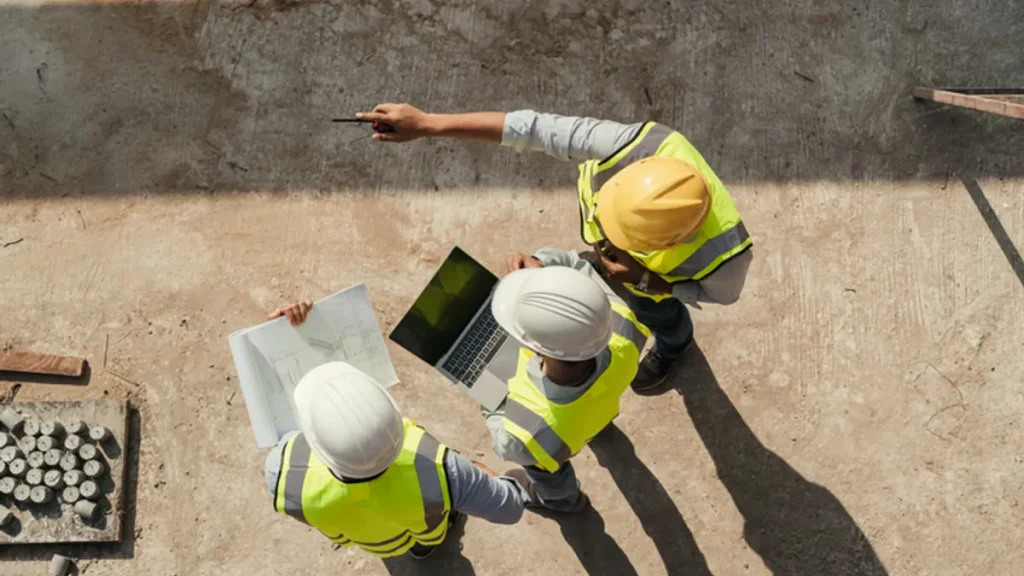The construction industry continues to evolve at an unprecedented pace, with new technologies, strategies, and challenges reshaping the way we build. As we move into 2025, staying ahead of emerging construction industry trends is crucial for construction professionals looking to maintain a competitive edge.
In this article, we explore the top construction trends set to define the industry this year.

2025 Construction Industry Trends
1. Increased Focus on Sustainability
Sustainability is no longer optional—it’s a necessity. Governments, clients, and stakeholders are pushing for greener construction practices to reduce environmental impact. Expect to see:
- Wider adoption of eco-friendly materials, such as recycled concrete and low-carbon cement.
- Energy-efficient designs, integrating renewable energy systems like solar panels and smart energy management tools.
- Regenerative building practices that go beyond reducing harm to actively improving ecosystems.
2. The Rise of Modular and Prefabricated Construction
Modular and prefabricated construction methods are gaining traction due to their ability to reduce costs, time, and waste. These approaches:
- Shorten project timelines by manufacturing components offsite.
- Ensure higher quality control with factory-built precision.
- Enhance sustainability by minimising material waste.
3. Advanced Construction Technology
Technology remains a driving force behind efficiency and innovation in construction. In 2025, key advancements include:
- AI and Machine Learning: Used to predict project delays, optimise resource allocation, and analyse site safety risks.
- Robotics and Automation: From bricklaying robots to autonomous construction vehicles, these tools are transforming workflows.
- Building Information Modelling (BIM): Enhanced 4D and 5D BIM capabilities enable detailed visualisation and cost estimation.
4. Workforce Challenges and Solutions
Labour shortages continue to be a significant challenge. To address this:
- Upskilling initiatives are focusing on training workers in new technologies.
- Flexible scheduling tools, like SiteSchedule, ensure that teams are deployed effectively.
- Remote project management solutions allow for better oversight and collaboration, even with dispersed teams.
5. Data-Driven Decision Making
The ability to make informed decisions based on real-time data is revolutionising project management. Tools like SiteSchedule offer:
- Resource tracking to optimise workforce and equipment use.
- Progress monitoring to keep projects on schedule.
- Customised reporting for better insights into project performance.
6. Increased Emphasis on Safety
Safety remains a top priority, with new technologies improving how risks are identified and mitigated. In 2025, expect to see:
- Wearable technology like smart helmets and vests to monitor worker health.
- AI-driven hazard detection, providing real-time alerts about potential safety issues.
- Enhanced training programs using virtual reality to simulate jobsite conditions.
7. Adoption of Smart Scheduling Software
Effective scheduling is essential in navigating the complexities of modern construction projects. Tools like SiteSchedule are leading the way by offering:
- Drag-and-drop interfaces for intuitive workforce scheduling.
- Real-time updates to accommodate changes instantly.
- Automated notifications to ensure teams stay informed and aligned.
How to implement Construction Industry Trends in your business
mplementing the latest construction industry trends in your business requires a strategic approach. Here’s how you can successfully integrate these trends into your operations:
1. Invest in Sustainable Practices
- Conduct a sustainability audit to identify areas for improvement.
- Source materials from suppliers offering eco-friendly options.
- Implement energy-efficient designs, such as solar panel installations and smart HVAC systems.
- Train your workforce on sustainable construction methods.
2. Leverage Modular and Prefabricated Construction
- Assess which projects can benefit from modular construction techniques.
- Partner with modular construction companies to reduce on-site waste and timelines.
- Implement quality control measures to ensure prefabricated components meet industry standards.
3. Adopt Advanced Construction Technologies
- Invest in AI and machine learning tools to improve project planning and risk management.
- Utilize robotics for repetitive tasks to enhance efficiency and accuracy.
- Implement BIM software for better collaboration and project visualization.
4. Address Workforce Challenges Proactively
- Develop training programs to upskill workers in modern construction technologies.
- Offer flexible work arrangements to attract and retain talent.
- Use workforce management tools like SiteSchedule to optimise scheduling and reduce downtime.
5. Utilize Data for Smarter Decision-Making
- Implement project management software that provides real-time insights.
- Use predictive analytics to anticipate project risks and mitigate delays.
- Generate data-driven reports to improve efficiency and resource allocation.
6. Prioritize Safety and Compliance
- Invest in wearable technology to monitor worker safety and health.
- Conduct regular safety training using VR and AI simulations.
- Ensure compliance with updated industry regulations and best practices.
7. Implement Smart Scheduling Software
- Automate scheduling tasks to reduce manual errors.
- Utilise cloud-based scheduling platforms for real-time collaboration.
- Integrate scheduling software with other project management tools for streamlined operations.
By adopting these industry trends and leveraging solutions like SiteSchedule, construction businesses can increase efficiency, enhance safety, and drive profitability in 2025 and beyond.
Ready to take your construction management to the next level? Start Free trial and start optimising your site scheduling today!
Ready to take your construction management to the next level? Learn more about SiteSchedule and start optimising your site scheduling today!

